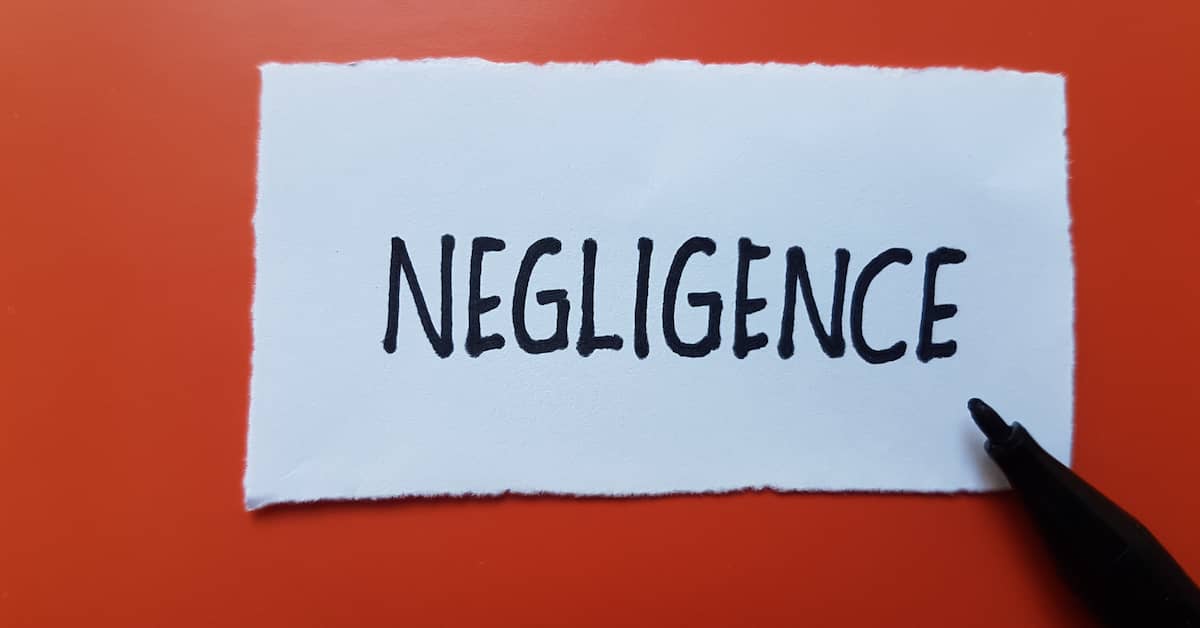
What Is the Difference Between Negligence and Gross Negligence?
In personal injury law, two terms frequently arise—negligence and gross negligence. Although they may sound similar, they are distinct concepts with different legal ramifications. Understanding the distinctions between these two is essential, not just for legal practitioners but also for potential plaintiffs seeking justice.
If you’ve found yourself injured due to someone else’s negligence, determining if it constitutes gross negligence will be vital to your claim for compensation. However, when dealing with the physical, emotional, and financial ramifications of an injury, the last thing you’ll want to take on is learning about the civil legal system. That’s where Maggiano, DiGirolamo & Lizzi can help.
Call our personal injury attorneys at (201) 585-9111 (New Jersey) or (212) 543-1600 (New York) for a FREE consultation. We are dedicated, courageous, and driven to attain justice for our clients in cases of ordinary negligence and gross negligence.
What Is Negligence?
At its core, negligence is the failure to exercise the care that a reasonably prudent person would have exercised in a similar situation. It is a deviation from the standard behavior expected of a person in a particular scenario.
In legal contexts, proving negligence generally requires the demonstration of four elements:
- Duty: The defendant had a duty of care toward the plaintiff.
- Breach: The defendant breached that duty.
- Causation: An injury was a direct cause of the breach.
- Damages: The plaintiff suffered actual harm or damages due to the injury.
In both New York and New Jersey, negligence serves as the foundational principle in personal injury cases. Whether it’s a truck accident, construction accident, or medical malpractice, negligence often plays a critical role in determining liability.
Read More: What Is Negligence?
What Is the Definition of Gross Negligence?
To define gross negligence, we have to take ordinary negligence and go a step further. It’s not just a mere lapse in judgment or oversight; it’s a severe and reckless disregard for the safety or lives of others. Gross negligence goes beyond carelessness to indicate a conscious and voluntary disregard for the need to exercise reasonable care.
To paint a clearer picture, consider a driver who runs a red light because they are momentarily distracted—this could be construed as ordinary negligence. But if that same driver knowingly speeds through multiple red lights in a dense pedestrian area just for the thrill of it, that behavior could be classified as the very definition of gross negligence.
Legal Consequences & Distinctions
The distinction between ordinary negligence and gross negligence isn’t merely academic—it has significant legal implications:
Damages
In some instances, particularly where contracts contain exculpatory clauses that protect parties from liability for their own negligence, proving gross negligence can be a means to circumvent these clauses and obtain damages.
What Are Punitive Damages for Gross Negligence?
Punitive damages are meant to punish and deter especially egregious behavior. They are rarely awarded, primarily because negligent parties are typically not subjected to penalties exceeding the need to provide monetary compensation to those they’ve injured. However, in many jurisdictions, punitive damages can be awarded in cases of gross negligence or intentional wrongdoing.
Read More: What Are Punitive Damages?
In New York, punitive damages may be awarded without a cap in cases of grossly negligent, intentional, or exceedingly harmful behavior. “The misconduct must be exceptional, as when the wrongdoer has acted maliciously, wantonly, or with a recklessness that betokens an improper motive or vindictiveness . . . or has engaged in outrageous or oppressive intentional misconduct or with reckless or wanton disregard of safety or rights.”
In New Jersey, on the other hand, gross negligence does not meet the “burden of proof” for the application of punitive damages, per N.J. Statutes § 2A:15-5.12. Instead, there must be an act of malice and a wanton and willful disregard for others to meet the standard for this type of award.
Immunity and Protections
Certain statutory protections or immunities might shield individuals or entities from negligence claims. However, these shields may not extend to acts of gross negligence. For instance, suppose a public employee causes harm through grossly negligent conduct. The usual process might place the liability on the government organization; however, with gross negligence, the employee may bear the brunt of liability directly.
What Are Some Examples of Gross Negligence?
Below are some incidents that might qualify as examples of gross negligence, depending on the severity and recklessness of the actions involved and the jurisdiction in which they occur:
Drunk Driving
A person driving under the influence of alcohol or drugs when they cause an accident and injuries could be found grossly negligent, as their behavior shows a severe disregard for the safety of others.
An example of gross negligence in this type of situation could involve a driver who chooses to get behind the wheel after leaving a bar. Suppose this driver, who is visibly intoxicated, has a blood alcohol content (BAC) of more than twice the legal limit. They speed through a red light in a residential area and cause a severe collision with another vehicle that results in serious injuries.
In this case, the driver knowingly operated the vehicle while impaired. They also exhibited reckless behavior by speeding and disregarding traffic signals, which significantly increased the risk of harming others.
This behavior could be defined as gross negligence as it demonstrates a blatant and extreme disregard for public safety. Gross negligence examples like this are far too common. This goes beyond ordinary negligence and has the potential to lead to terrible—even fatal—injuries.
Medical Malpractice
A healthcare professional could be deemed grossly negligent if their actions deviate drastically from the standard of care. For instance, if a surgeon operates on the wrong body part or leaves a medical instrument inside a patient.
Another example of gross negligence in a medical setting could involve a doctor who prescribes or administers a medication to which a patient has a life-threatening allergy despite clear, well-documented patient records and warnings. If the doctor fails to check the patient’s chart or ignores a nurse’s warning about the allergy, it could be considered gross negligence.
The doctor’s actions demonstrate a serious lack of care and attention to basic medical procedures. This behavior deviates markedly from the standard of care that a reasonable healthcare professional would be expected to provide and could easily have delivered.
Premises Liability
Property owners could be held grossly negligent for ignoring evident hazards on their premises. For instance, if a landlord knew about a faulty staircase but didn’t fix it, leading to a tenant’s severe injury.
A further example of gross negligence in premises liability could involve a store owner who was informed that a section of the store ceiling was unstable and could collapse. Despite multiple warnings from employees and even customers, the owner still fails to close off the area or make any repairs because they don’t feel like spending the money.
If the ceiling later collapses and causes severe injuries, the owner’s complete disregard for the safety of others could be classified as grossly negligent.
Property owners have a legal duty to maintain safe premises. Ignoring serious hazards to save a buck puts lives at risk.
Product Liability
Manufacturers could be held grossly negligent if they knowingly sell defective or hazardous products without warning the public, leading to severe injuries or deaths.
An example of gross negligence in product liability could be a toy manufacturer discovering that one of their most popular children’s toys is a choking hazard. Despite repeatedly being made aware of the danger through customer complaints, the manufacturer continues to produce and sell the toy with no warnings or recalls because they don’t want to lose revenue.
If children then choke on the toy and suffer serious or fatal injuries, the manufacturer’s blatant disregard for children’s well-being could be considered gross negligence.
Manufacturers have a responsibility to consumers to ensure their products are safe for use. Knowing about a dangerous defect and choosing not to do anything about it demonstrates a clear disregard for consumer safety and could have disastrous and deadly consequences.
Please note that these are just possible examples of gross negligence. Whether a specific case amounts to gross negligence would depend on the particular facts and circumstances, as well as the interpretation of the law by the courts. In such situations, consulting with a knowledgeable personal injury attorney is crucial to understanding one’s legal rights and options.
What Is a Real-Life Example of Gross Negligence?
In October 2003, the construction of a parking garage at the Tropicana Casino in Atlantic City, New Jersey, resulted in a tragic building collapse that killed four workers and injured 21 others. An investigation revealed serious lapses in safety procedures, indicating gross negligence on the part of the contractors.
Fabi Construction and Network Contractors were found to have ignored important safety protocols. Structural engineers found that essential beams and supports were inadequately secured, which caused a catastrophic structural failure. The contractors were also found to have been rushing construction. They ignored warnings from both workers and safety personnel about the building’s instability.
MDL partners—Michael Maggiano and Christopher DiGirolamo, as members of the plaintiff’s counsel trial team—successfully settled the Tropicana garage collapse case for $101 million. The MDL team was able to demonstrate that the garage was poorly constructed, which allowed the floors of the structure to slide down, causing a deadly and injurious collapse.
The conscious disregard for safety standards went far beyond ordinary negligence. While the contractors knew the risks, they chose to prioritize speed and cut costs over worker safety. Thus, they were directly responsible for the resulting deaths and injuries.
This case is a devastating example of gross negligence. The reckless decision to ignore critical warnings endangered lives. Though justice was served, the lives of the victims and their families will be forever changed.
Is It Hard To Prove Gross Negligence?
It is one thing to define gross negligence and another to prove it. Proving gross negligence can be much more challenging than proving ordinary negligence because it requires showing more than just carelessness or a mistake. Instead of demonstrating a simple failure to use reasonable care, you have to go a step further and show that the responsible party acted with a reckless and conscious disregard for the safety and well-being of others.
There are several reasons why this is difficult:
- Showing the defendant’s intent or state of mind can seem impossible, especially if there are no direct statements or actions to demonstrate it.
- A higher legal threshold must be met, showing that the defendant’s actions or inactions were so egregious that they went beyond mere carelessness.
- Exactly what constitutes “gross negligence” is highly subjective. From case to case, each judge and jury will interpret it differently.
Gross negligence is hard to prove because it involves showing that the defendant’s behavior crossed a line. Where that line is can be subjective, and demonstrating the defendant’s intentions can be problematic without clear evidence.
If you believe that gross negligence was the cause of your injuries, hiring an experienced lawyer skilled in building strong cases, will help you prove your claim. The personal injury attorneys at Maggiano, DiGirolamo & Lizzi are just the ones to assist.
A Personal Injury Lawyer Can Help!
While the distinction between negligence and gross negligence can seem simple, its implications are profound. For those seeking redress for personal injuries, it’s important to understand the differences between ordinary negligence and gross negligence and have a legal team that can navigate the complexities of New York and New Jersey law.
At Maggiano, DiGirolamo & Lizzi, we pride ourselves on our ability to understand, strategize, and champion our clients’ causes. If you believe you’ve been a victim of negligence or gross negligence, don’t hesitate. Reach out for a FREE consultation and let our team guide you in the pursuit of justice.
Contact our personal injury attorneys today! We approach cases with courage, dedication, and an unwavering commitment to those we represent. Let us ensure you are pursuing the just compensation you deserve for your losses. Our personal injury lawyers are proud to help protect the rights of the injured in both New York and New Jersey.


















